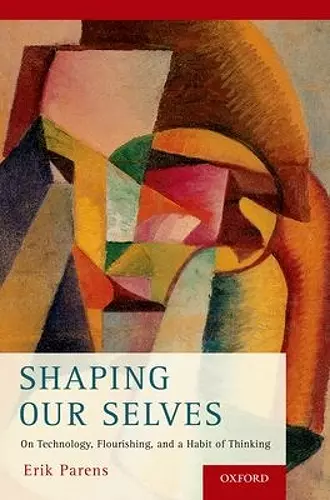Shaping Our Selves
On Technology, Flourishing, and a Habit of Thinking
Format:Paperback
Publisher:Oxford University Press Inc
Published:20th Oct '16
Currently unavailable, and unfortunately no date known when it will be back
This paperback is available in another edition too:
- Hardback£46.99(9780190211745)

When bioethicists debate the use of technologies like surgery and pharmacology to shape our selves, they are, ultimately, debating what it means for human beings to flourish. They are debating what makes animals like us truly happy, and whether the technologies at issue will bring us closer to or farther from such happiness. The positions that participants adopt in debates regarding such ancient and fundamental questions are often polarized, and cannot help but be deeply personal. It is no wonder that the debates are sometimes acrimonious. How, then, should critics of and enthusiasts about technological self-transformation move forward? Based on his experience at the oldest free-standing bioethics research institute in the world, Erik Parens proposes a habit of thinking, which he calls "binocular." As our brains integrate slightly different information from our two eyes to achieve depth of visual perception, we need to try to integrate greatly different insights on the two sides of the debates about technologically shaping our selves-if depth of intellectual understanding is what we are after. Binocular thinking lets us benefit from the insights that are visible from the stance of the enthusiast, who emphasizes that using technology to creatively transform our selves will make us happier, and to benefit from the insights that are visible from the stance of the critic, who emphasizes that learning to let our selves be will make us happier. Parens observes that in debates as personal as these, we all-critics and enthusiasts alike-give reasons that we are partial to. In the throes of our passion to make our case, we exaggerate our insights and all-too-often fall into the conceptual traps that language sets for us. Foolishly, we make conceptual choices that no one who truly wanted understanding would accept: Are technologies value-free or value-laden? Are human beings by nature creators or creatures? Is disability a medical or a social phenomenon? Indeed, are we free or determined? Parens explains how participating in these debates for two decades helped him articulate the binocular habit of thinking that is better at benefiting from the insights in both poles of those binaries than was the habit of thinking he originally brought to the debates. Finally, Parens celebrates that bioethics doesn't aspire only to deeper thinking, but also to better...
In his discriminating new book ..., Erik Parens...offers both a diagnosis and a partial solution to poisonous polarization. Elegantly written, insightful, and uncharacteristically personal for Parens, Shaping Our Selves: On Technology, Flourishing, and a Habit of Thinking is a discourse on ethics in the broadest sense. That is, it is a sustained reflection on what it is for creatures like us to live a life well, together. This book should appeal to anyone who thinks seriously about such questions. And it should especially appeal to those who wish to engage in debates in this area-or in any area-in a way that is productive, rather than antagonistic. * Brian Earp and Michael Hauskeller, American Journal of Bioethics *
This volume is an ideal vehicle for undergraduate bioethics education, not only as a companion to teaching based on issues, cases, and even principles, but also as an introduction to a set of critical current issues arising from biotechnological developments. In my teaching experience, many medical students, for example, would benefit from being introduced, in a volume like this, to the expansive landscape that lies between 'Here is the answer' and 'It's all just a matter of opinion.' * Nancy M. P. King, Kennedy Institute of Ethics Journal *
Shaping Our Selves would make a great introductory book for any clinician, student, or layperson who is trying to make sense of contemporary debates on biomedical technologies. The book covers wide ground, and will help develop a habit of thinking that approaches ethical dilemmas with openness and humility . His book is very personal, at times almost poetic; I think it is destined to become a classic. * Tom Shakespeare, The Lancet *
ISBN: 9780190645892
Dimensions: 210mm x 140mm x 13mm
Weight: 268g
216 pages